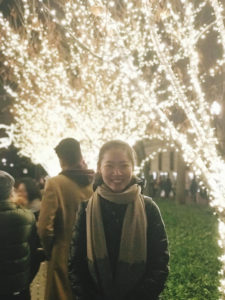Please join us in congratulating our undergraduate 2020-21 Senior Thesis writers for all of their hard work and efforts in the Senior Thesis Program! These students did an outstanding job and will receive the Oscar Lee Award for Senior Thesis Writers for their achievements.

Bio: Maggie Moran is a member of Barnard College’s Class of 2021, majoring in East Asian Cultures with a concentration in Film & Media Studies. She has just completed her senior thesis, ““Soft on the Outside, Strong on the Inside”: An Analysis of Women’s Language in North Korean State Discourse,” with the guidance of her advisor, Professor Ted Hughes. Her other academic interests include sociolinguistics, translation, and contemporary political history. She hopes to synthesize these interests into an advanced degree and eventual career in academia or bilingual education, and for now will be working at the Japan Center for International Exchange just a few blocks from campus.
Thesis Abstract:
Among its post-revolutionary neighbors, the USSR and China, North Korea has done a comparatively good job of elevating the economic and official standing of women, at least on the surface. In state documents, women are afforded equal rights as men, and practices like paid maternity leave show an effort to promote the status of women in the workforce. However, prescriptive language documents reveal the uneven reality of gender relations in North Korean ideology. While there is considerable documentation of linguistic divergence between the languages of North and South Korea, limited research exists on the relationship between politics and language prescription in North Korea, and almost none focused on gender. This analysis will reveal that prescriptive language documents can be seen as a reflection and extension of broader themes in gender relations in North Korea: simultaneously championing women as leaders of revolution in need of liberation from domestic burdens, while also assigning them extra labor in the form of prescribed speech behaviors.
Starting with Kim Il-Sung’s 1964 and 1966 talks with linguists, the state has exalted North Korea’s standardized language, called munhwaŏ (literally “cultured language”), as an important and primordial expression of the Korean concept of Juche, or “self-reliance,” in contrast with the Southern variety of p’yojunŏ (literally “standard language”), reviled for being infected by foreign influence. State publications on language and linguistics provide a body of discourse through which we can see the production and reproduction of social attitudes. One of the most critical ways language policy was disseminated to the public was through the official North Korean language planning journal Munhwaŏ Haksŭp (Cultured Language Learning), which includes articles on topics like proper speech, pronunciation, and language education. Many articles in this journal show a disproportionate emphasis on women’s speech as uniquely suited to expressing North Korean values, such as outward strength and inner beauty. Through analysis of state-produced documents related to language planning, primarily Munhwaŏ Haksŭp, this paper argues that the linguistic prescriptions placed on women reflect the location of a unique national spirit in women that men do not embody.

Bio: Helen (Jiawen) Zhang is a member of Columbia College’s Class of 2021, majoring in both History and East Asian Studies. She is interested in exploring gender, family, and rural dynamics and their respective transformations in the twentieth and twenty-first century. After graduation, she hopes to pursue a legal career to advocate for complete gender equality and to assist marginalized communities in East Asia. Her senior thesis, “How Comfort Women Speak: Politics and Social Norms in Comfort Women’s Narratives,” under the guidance of Professor Jungwon Kim, explored the issue of comfort women.
Thesis Abstract:
From 1932 to 1945, the Japanese Imperial Army drafted around 200,000 East Asian women into military sexual slavery, euphemistically referred to in Japanese as ianfu or “comfort women.” Eighty percent of the victims consisted of rural women from farms and villages across China, Korea, and Southeast Asia. Their poverty, fear of male authority, and low status in familial hierarchies made them vulnerable to the exploits of the Japanese army. Rural women’s lack of social agency was compounded by weak local opposition against the recruitment of comfort women and the establishment of comfort stations. These same vulnerabilities continued to shape rural women’s experiences after the war and comfort women system ended. Surviving comfort women endured shame and poverty, and were thus marginalized, unable to tell their stories after the war.
My research considers what the comfort women’s testimonies, from both Korea and China, can tell us about their individual experiences. Most of the women who gave testimonies were from a rural background, so I ask how comfort women’s narratives illuminate the cultural and economic realities of rural life and the vulnerabilities they faced. What impact did this have on why comfort women choose to remain silent for nearly half a century, and why did only fifty comfort women victims come forward after 1991? What prompted women to overcome possible public discrimination and self-shame and suddenly reveal and confess their stories at that moment? I examine what common themes we can draw from their stories, what their stories reveal about their wartime experience, and how institutions shaped how their stories were told and disseminated. Beyond the political and feminist subtexts, in what ways do women demonstrate their own agency in their testimonies? How do women demonstrate their own agency, but also reveal the victimization, discrimination, and objectification they experienced in their testimonies? I use comfort women’s testimonies to demonstrate how the telling of victim’s stories was shaped both by victim’s experienced trauma and by platforms which record and disseminate victims’ stories, delineating specific parameters for comfort women’s stories.

